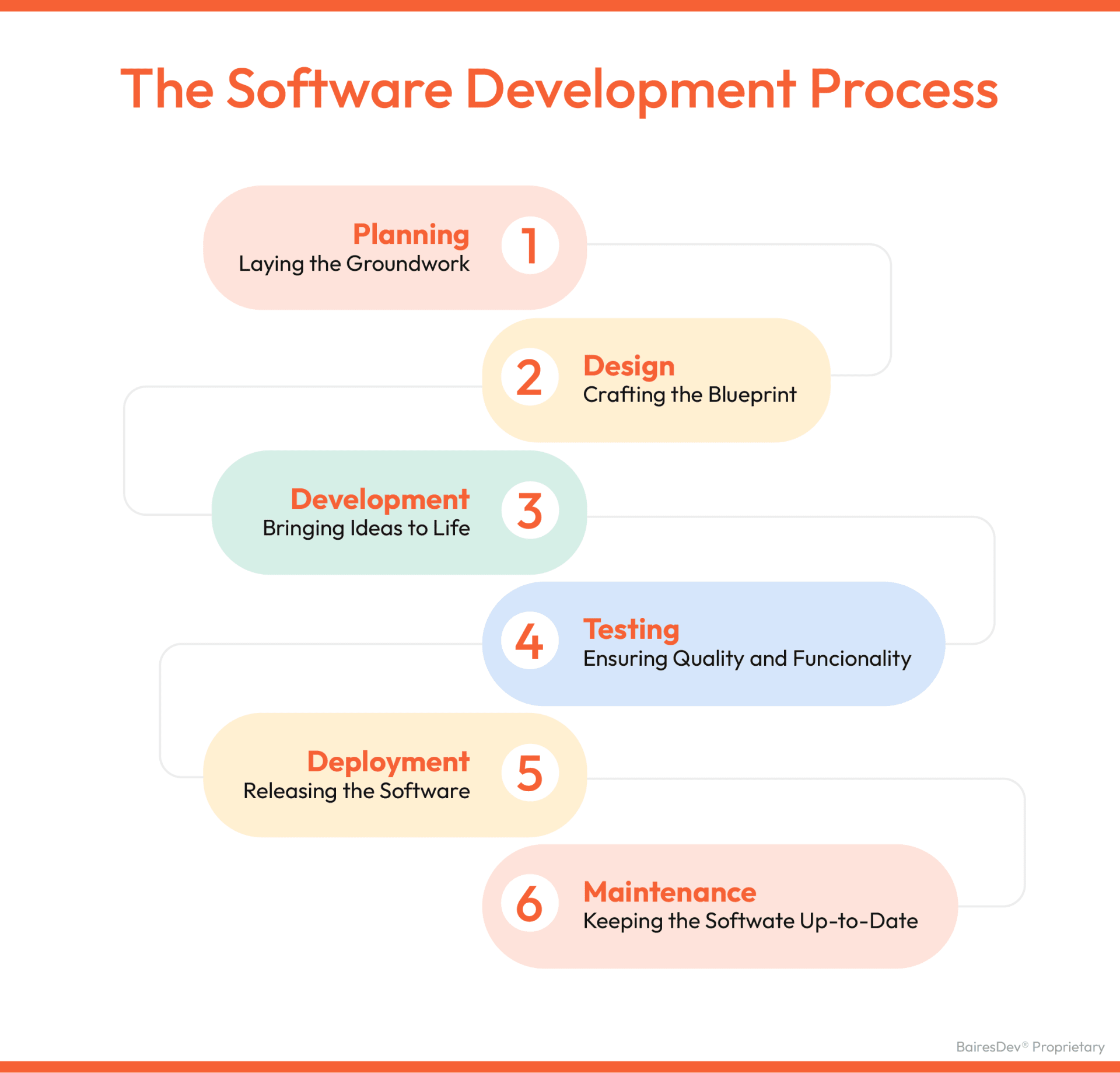Have you ever wondered how your favorite apps, websites, and digital games come to life? Behind every click, swipe, and interaction is the world of software development – a fascinating blend of creativity, problem-solving, and technical skill.
At its core, software development is about creating programs that run on computers, smartphones, and other devices. It’s a process that turns ideas into reality, making the digital world both functional and engaging. Think of it as building a house, but instead of bricks and mortar, developers use code to construct digital solutions.
What makes software development unique is its blend of creativity and logic. Developers are like modern-day wizards, using their coding spells to bring ideas to life. They solve puzzles, think critically, and often have to be imaginative to find the best solutions to complex problems.
What Is Software Development?
Software development involves creating applications by designing, coding, testing and maintaining software solutions. It applies computer science and mathematical principles to build efficient, reliable, user-friendly programs that address real-world problems and needs that evolve over time. The iterative process balances technical precision with practical functionality.
Advanced software development requires more than just mastering programming languages. It demands applying key computer science concepts like algorithms, data structures, and design patterns to write code that’s efficient, scalable, and easy to maintain over time. The trick is matching the right languages, frameworks, or libraries to the problem you’re solving. It’s as much about understanding tradeoffs as syntax.
The Software Development Process

Building software is no easy feat—it takes planning, precision, and patience. Aspiring developers should understand the Software Development LifeCycle. The SDLC guides a systematic, phased transformation of concepts into functioning code ready for real-world application. Grasping this structured development process is key for turning ideas into software solutions.
1. Planning – Laying the Groundwork: The foundation of great software is thorough planning. This stage focuses on understanding project needs, defining its scope, and determining resource distribution while balancing time, budget, and technological constraints.
2. Design: Crafting the Blueprint: In the design phase, developers and designers team up to blend technical architecture with user experience. They work on crafting intuitive interfaces and efficient system layouts, often building prototypes and setting technical specs to bring the software concept to life.
3. Development: Bringing Ideas to Life: This is where the real action takes place – coding. Developers get down to writing code, compiling it, testing, and then transforming the software design blueprints into functional software. During this phase, they might follow Agile or Waterfall software development methodologies, depending on what the project calls for.
4. Testing: Ensuring Quality and Functionality: Testing is key to ensuring a smooth user experience. It includes different tests – unit, integration, system, and acceptance – to spot and fix bugs, making sure the software ticks all the boxes.
5. Deployment: Releasing the Software: Once tested, the software is deployed to a production environment where users can access it. This might be a gradual process using techniques like rolling updates or blue-green deployments to minimize disruptions.
6. Maintenance: Keeping the Software Up-to-Date: Post-deployment, the software needs regular updates and maintenance to fix issues, enhance features, and improve performance. This phase ensures the software remains relevant and efficient over time.
The Software Development Life Cycle continuously loops as developers improve and update applications. Understanding this core cycle is fundamental for software builders. It’s through this structured, repetitive process of planning, building, and enhancing that concepts become user-friendly programs that stand the test of time.
Software Development Jobs
Software development has evolved from a coding-centric discipline into an industry full of diverse, dynamic career opportunities spanning analytical to creative interests. From crafting elegant user interfaces to bolstering system reliability to pushing digital innovation boundaries, there are specialized roles to match distinct passions.
This thriving job ecosystem covers agile coders, quality assurance testers, security architects, and more—each requiring specific competencies and duties.
- Software Developer/Engineer: These professionals are the heart of software creation. They design, code, and implement software solutions. Specializations can include web development, mobile app development, or system software.
- Front-End Developer: Focused on application programming interfaces and user experience, front-end developers create the visual elements of software, using languages like HTML, CSS, and JavaScript.
- Back-End Developer: These developers work on server-side development, dealing with databases, server logic, and application integration. They often use languages like Java, Python, and Ruby.
- Full-Stack Developer: A blend of front-end and back-end development, full-stack developers are versatile professionals who can handle all aspects of software development.
- DevOps Engineer: Bridging the gap between development and operations, DevOps engineers work on streamlining and automating the software deployment process, ensuring high system performance and reliability.
- Quality Assurance (QA) Engineer: QA engineers focus on software testing, identifying bugs, and ensuring the quality of the final product before its release.
- Data Scientist/Engineer: These roles involve working with big data, developing algorithms, and creating data models to analyze and interpret complex datasets, often for decision-making purposes.
- UX/UI Designer: Focused on user experience (UX) and user interface (UI), these designers ensure that software is not only functional but also intuitive and user-friendly.
- Mobile Developer: Specializing in mobile platforms like iOS and Android, mobile developers create apps specifically designed for mobile devices.
- Game Developer: They specialize in writing software code for video games, including game mechanics, graphics, AI, and sound.
- Security Engineer: Focused on cybersecurity, these software engineers develop software and systems, protocols, and strategies to protect software and data from attacks.
- Systems Architect: They design the overall structure of a digital ecosystem, defining technical standards and policies.
Types Of Software Development
There are many different types of software development. Often, the various kinds of developers work together to bring your project to fruition. Here are just 10 of the many kinds available. Some of them overlap and can be found in a single professional, while others require a distinct skill set.
#1 Front-end Development
Every time you look at a website, you’re seeing the work of the front-end developer. These experts work on the part of the product with which the user interacts. They are primarily concerned with the user interface (UI). For example, they might create the layout, visual aspects, and interactive elements of a website or app. However, their role isn’t identical to that of a UI or user experience (UX) designer. They also fix bugs and make certain that the UI can run on different browsers.
They must be highly proficient in programming and work closely with the backend developers to ensure that the two aspects of the product function cohesively.
#2 Back-end Development
In contrast, a back-end developer works with the part of the product users can’t see — the back end. This professional builds the infrastructure that powers the website, app, or program, focusing on functionality, integration of systems, and core logic. They will also deal with the complex, underlying structure, ensuring strong performance, scalability, and security.
As we mentioned above, the front-end and back-end developers work closely together to create a final product. They both play important roles in completing a project.
#3 Full-Stack Development
A full-stack developer works on all aspects of the product, including both the front and back ends. To be a successful full-stack developer, you must have strong programming skills, as well as a variety of soft skills that all tech professionals must have, such as problem-solving and critical thinking. At the end of the day, you — and perhaps your team — are responsible for creating a full, complete product, such as a fully-functioning web application.
While this type of developer may sound like the best of both worlds, it’s important to understand that the process may be slower with one person doing the bulk of the work.
#4 Desktop Development
Desktop developers exclusively create applications that run on a desktop operating system, such as Windows, Mac, or Linux. This is opposed to developers that create applications that run on mobile, tablet, or other devices.
This type of specialization was more ubiquitous in the early days of programming, back before the days of mobile applications. However, they still have a place in today’s landscape.
#5 Web Development
Web development is the process of building web applications. People use these apps through an internet browser on a multitude of devices. This is different from a mobile app, which runs on a phone or tablet and doesn’t necessarily require an internet connection to run.
Web development is an umbrella term encompassing both front and backend development. Professionals can also be full-stack web developers.
#6 Database Development
Not to be confused with a database administrator, who typically works with daily database upkeep and troubleshooting and implements the system, a database developer is responsible for building the database, modifying and designing existing or new programs, and ensuring that they satisfy the requirements of the users. Sometimes, the roles of database administrator and developer do overlap — this depends on the needs of the client or employer.
#7 Mobile Development
As is probably obvious from the name, a mobile developer builds applications that run natively on mobile devices, including smartphones, tablets, and some types of smartwatches. Usually, these professionals will specialize in either iOS or Android development but not both.
It is possible to work with the two operating systems. However, many companies will work with developers who are experts in just one. That’s because they tend to be more knowledgeable about the intricacies of each type of development than those who dabble in both of them since the tools, frameworks, and languages tend to be different.
#8 Cloud Computing
Cloud computing encompasses services, programs, and applications that run over the cloud. That means they can be accessed remotely from practically any location, provided the user has an internet connection and an appropriate login. Many of the tools most people use every day, such as Google Docs, are cloud-based applications. They offer plenty of advantages, including scalability.
Some developers specialize in cloud computing — that is, the creation of cloud platforms. They will build cloud applications and facilitate cloud deployment and migration, as well as manage cloud services and provide maintenance to users.
#9 DevOps Engineering
DevOps is a set of practices and philosophies that are focused on the quick, efficient, and customer-centric delivery of software. Related to Agile, this style has been widely adopted by software developers and teams around the world.
DevOps engineers work with teams that practice the principles. They participate not only in the development of the product at hand but also in quality assurance (QA) testing and eventual deployment. They must possess a wide range of skills, such as programming, integration, scripting, QA testing, and more. They also need to blend theory and practice to support and work with the rest of the team, which may include software developers and QA professionals.
#10 Security Engineering
Everyone knows how important security in software is in this day and age. Security software professionals are dedicated to ensuring the security of various technological systems. They must have extensive knowledge of the methodology, practices, tools, and patterns cybercriminals employ to hack software so they can help prevent these attacks from taking place.
Ethical hackers are one example of this type of professional. They work with clients to attempt to hack software to pinpoint and expose vulnerabilities, allowing them to patch them before they are exploited by cybercriminals.
This is by no means a comprehensive list of all the types of software engineering — the field is wide and varied. However, these are still some of the most important types you should understand when looking to hire developers and development teams to work on your next software project — and build a high-quality product.
Your needs will change, and you may find yourself looking for different types of skilled software engineers at given times. In any case, it’s important to determine your requirements ahead of time and carefully research each professional or team you consider hiring, looking at their past work and references or testimonials. While the types of software development skills and experience vary by specialty, your standards for quality should be consistently high.
FAQ
What is software development?
Effective software development refers to writing, maintaining source code, and activities like designing, deploying, and supporting software. It includes creating, programming, testing, and bug fixing in software applications and frameworks.
What is the role of a software developer?
Most software developers design, code, test, and maintain software applications. They create models and diagrams for coding, perform maintenance and testing, and document the process for future upgrades and maintenance. Some roles require a level of project management.
How does software development work?
The software development process involves designing, coding, testing, and maintaining software. It follows the Software Development Life Cycle (SDLC), which includes planning, writing, modifying, and maintaining software to meet specific requirements.







